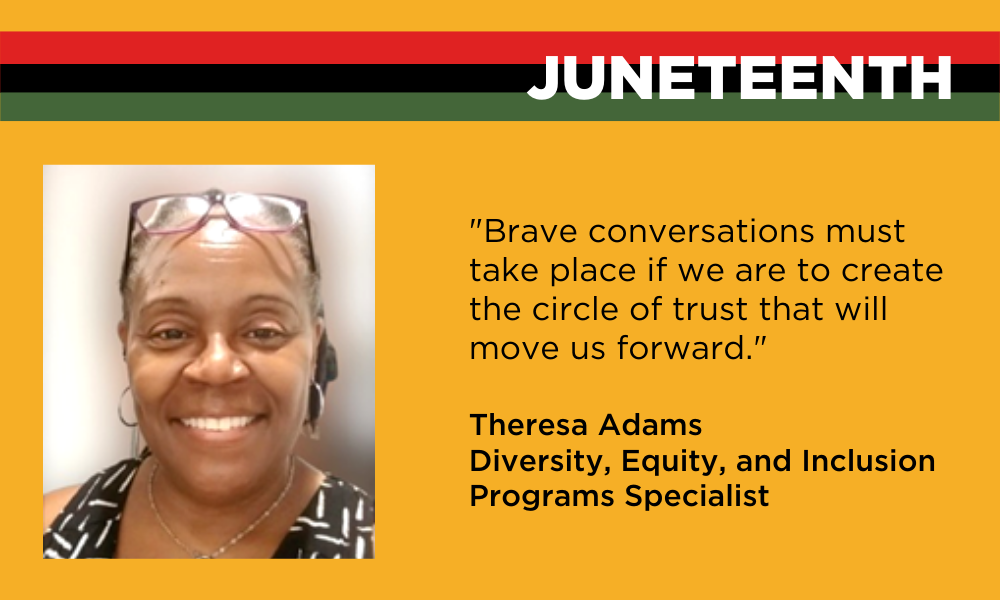Theresa Adams: Seeing Juneteenth ‘Through the Eyes of Those Who Went Before Me’

In honor of Juneteenth, Theresa Adams, PSA’s Diversity, Equity, and Inclusion Programs Specialist, shares her personal journey of learning about the importance of the holiday through her family’s history, and sheds light on the steps we all can take to bring understanding and healing.
Juneteenth is the oldest nationally celebrated commemoration of the ending of slavery in the United States, dating back to 1865. Known by several other names – Emancipation Day, Juneteenth Independence Day, and Black Independence Day – Juneteenth commemorates the end of slavery and celebrates the strength of the African American people.
Although I have spent several years in the Diversity space, my first opportunity to dive into the importance of this date came when a friend asked me to help with a presentation giving a brief history of Juneteenth. Through my research, I discovered that until recent years, there was little interest in Juneteenth celebrations by mainstream America. This was an eye-opener for me, especially living in New York City where the celebration of history and culture is so prevalent.
Helping my friend with her research caused me to ask myself why Juneteenth is so important. My questions took me to my family. Living in the small town of Hope Hull, Alabama, they remain some of the few Black landowners in this storied corner of the South. The road on which my family lives has two names. It is listed as Richardson Road for postal and GPS reasons, but those in Hope Hull know is at “Ms. Mary Watkins Road,” named after my grandmother.
While my roots are in Alabama, I grew up in NYC, where the harsh reality of slavery, Jim Crow, and segregation were not part of conversations like they are there. Growing up, I remember hearing stories that my grandmother told about slavery and segregation, but the meaning is not the same when you are a child. When I began to ask questions as an adult, the floodgates opened, and stories and articles came from across my family. They all wanted to help me in my journey to understand better the meaning and celebration of Juneteenth.
Two examples that stood out were a collection of stories and pictures compiled by my cousin, Tony Watkins, called “Shackled Again.” The other was a historical marker placed by the Lowndes County Remembrance Coalition. It memorialized the Black sharecroppers and union leaders, including G. Smith Watkins, who I’m told is a great uncle, who were lynched in 1935 to preserve White Supremacy.
I personally remember the experience of the day I walked into a cottonfield at the objection of my older brother, who as a small boy, recalled picking cotton with my grandmother. I picked several pieces and as I stood up, I closed my eyes and felt the wind against my face. I could hear the songs of the enslaved people as they picked the cotton. I couldn’t imagine what it must have been like to live in slavery with a dream of freedom and live to see it happen. This gave me a newfound respect for Juneteenth, as seen through the eyes of those who went before me and their journey to freedom.
Why celebrate Juneteenth, and why now? Following the murders of George Floyd, Briana Taylor, and so many others, the Jan. 6 Capitol Insurrection, and now the debate over Critical Race Theory, we must prioritize listening, understanding, and respecting our differences on the path to healing. Brave conversations must take place if we are to create the circle of trust that will move us forward as Dr. King, John Lewis, Medgar Evers, Rosa Parks, Barbara Jordan, and Shirley Chisholm intended.
I dreamed of a career in aviation during a time when doors for people who looked like me weren’t open. I wasn’t tall enough, wasn’t thin enough, wasn’t light enough, and my hair wasn’t straight enough. Here at PSA, I get to share my dream with others and encourage them to celebrate who they are and the importance of their accomplishments.
Not only did my dream of a career in aviation come true, but as DEI Program Specialist, I’m constantly inspired to keep moving PSA forward to be a leader in the industry. It’s an incredible feeling to walk through the airport or the American Airlines Training Center in Charlotte and see a class of PSA Flight Attendants or a team of PSA crew who look like me, my brothers, and my son. I smile and say to myself, “that’s me, I’m here.” I couldn’t ask for more.
To learn more about Juneteenth or participate in a local celebration, Theresa shares the following resources: